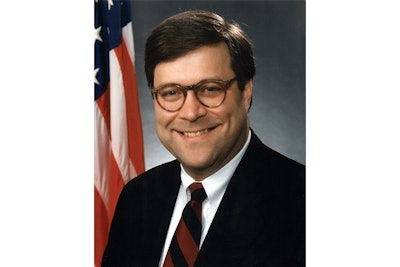
President Trump announced his intention to nominate William Barr for U.S. Attorney General, about one month after the forced resignation of Jeff Sessions.
Barr served as attorney general under former President George H.W. Bush, from 1991 to 1993. He also served as deputy U.S. attorney general from 1990 to 1991, before ascending to the top U.S. Department of Justice post. After his time with the DOJ, Barr worked as an executive at Verizon Communications. He retired in 2008.
"I did not know him until recently, when I went through the process of looking at people, and he was my first choice from Day 1," Trump told reporters on Dec. 7. (Currently, Matthew Whitaker has been serving as acting U.S. attorney general.)
U.S. Sen. Lindsey Graham (R-S.C.) called the Barr nomination “an outstanding choice.”
For the fragmented domestic cannabis industry, the news has been met with general ambivalence thus far. Based on preliminary research into Barr's past work in the federal government, his stance on cannabis legalization and reform is not yet clear; much of the early speculation is focused on how he'll engage Robert Mueller's investigation into alleged ties between the Trump presidential campaign and the Russian government.
According to Stefanie Miller, senior vice president of Height Capital Markets’ Special Situations team, “The neutral, reserved reaction was appropriate given our review of Barr’s history. Notable drug policy under Bush either happened before Barr became AG or through agencies other than the DOJ, leaving Barr with no expectation to comment. Moreover, even if Barr made critical comments while he was AG, those comments would be dated by a quarter century and in line with the beliefs of the majority of Americans in the early 1990s. It is our understanding that Barr has not made comments about marijuana policy in the years since he was AG, which leaves us in a holding pattern until more information is released."
However, Barr's time in the DOJ does point to a notable trend in incarceration rates. In October 1992, he oversaw the publication of a document praising new prison construction and an increased emphasis on heavy sentencing; that document followed a similar report, published in July 1992, that focused mainly on violent crime. "Of course," he wrote in October of that year, "we cannot incapacitate these criminals unless we build sufficient prison and jail space to house them. Revolving-door justice resulting from inadequate prison and jail space breeds disrespect for the law and places our citizens at risk, unnecessarily, of becoming victims of violent crime."
Also, in 1992, Barr told a Los Angeles Times reporter that “our [criminal justice] system is fair and does not treat people differently.” He had been asked by the reporter about racial disparities in prison sentencing. The matter of racial disparities in cannabis-related arrests and convictions, of course, is a major underpinning of the entire cannabis reform debate in the U.S.
Ames Grawert, senior counsel at the Brennan Center, wrote yesterday: "Barr is one of the few people left in policy circles who could reasonably be called as bad as, or worse than, Jeff Sessions on criminal justice reform."
NORML Political Director Justin Strekal offered a statement on Barr, with a look ahead to the momentum building in the U.S. Congress: “With every move by the Department of Justice facing intense public scrutiny, maintaining Jeff Sessions’ policy of reefer madness would be self-defeating. The movement to end the failed and cruel policy of marijuana criminalization is larger and stronger than ever, supported by a majority of Democrats, Republicans, and non-partisans. In 2018, five states legalized either the medicinal or adult-use of marijuana, making the total number of states out of compliance with the Controlled Substances Act now 47. It would be utterly absurd for William Barr or any agent of the Department of Justice to take any action against these state-sanctioned and operational programs.”























